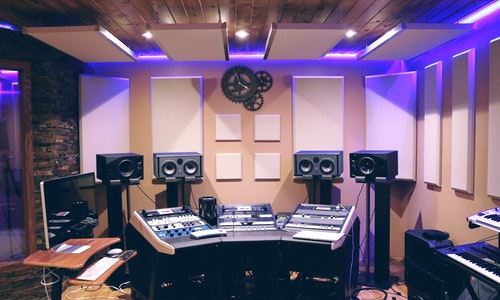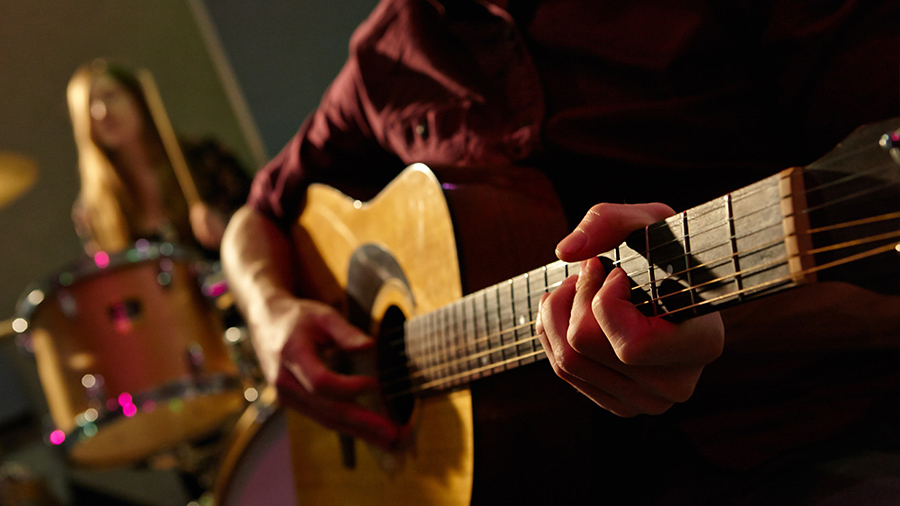Overview
DMU’s Music Technology BA is a distinctive, dynamic and market-leading course that challenges conventions in music composition and performance and explores the extraordinary musical possibilities offered by new technologies. It is ideal for forward-thinking and imaginative individuals whose passion is to create exceptional music and forge a unique voice within the arts and creative industries.
You will explore an extensive range of approaches to creating and performing, such as multi-track recording, production and composition, new technologies for musical performance, music and sound for moving image, sound synthesis theory and practice, site-specific and installation work, computer coding for the creative artist, and advanced surround sound.
You will study digital and post-digital history and aesthetics to inspire your creative vision and link your music meaningfully to the world. Based on your goals, you will choose specific compositional, technical and theoretical topics to research more deeply, particularly as you enter our flexible third year of study.
The course is taught by internationally recognised, experienced musicians who are active performers, composers and researchers.
Our professional, broad-minded and flexible graduates are well positioned to succeed in the thriving and rapidly changing contemporary digital media and music industries, and have a very strong track record at gaining employment as composers, sound designers, performing and recording artists, session musicians, recording engineers, producers and audio technicians in music management, theatre, TV and radio content and production.
Our superb facilities allow you to explore areas such as spatialisation, musical computing, sound recording and video. We also have an extremely lively musical community with frequent concerts, events, music profession visitors and student exchanges.
Key features
- Much of this programme is based in DMU’s Creative Technology Studios, where you will benefit from access to audio recording studios, broadcast-standard radio production studios and management systems. You will also benefit from access to our Performing Arts Centre for Excellence (PACE), which features performance and rehearsal spaces, including our specialist 33-channel loudspeaker system.
- Join a dynamic musical community which hosts concerts and workshops and has a number of musical groups such as the Dirty Electronics ensemble. The university also has many active student musical societies, including the Music Society, Recording Society, Sound Design Society, and DJ Society.
- Have opportunities to present your work at some of Leicester’s most important cultural institutions, including the CURVE Theatre, the Phoenix Cinema and Art Centre, and creative hub LCB Depot.
- Gain valuable, industry-relevant experience by contributing to the award-winning Demon Media group, which includes the Demon FM radio station and Demon TV.
- Through our Music, Technology and Innovation Institute for Sonic Creativity you can take part in events, undertake creative research, work with professional artists, lead workshops and contribute to international research projects.
- Benefit from guest lectures from music industry specialists. Previous guest speakers include Merzbow, Mira Calix, Tim Exile, DJ Sniff, Scanner, Pauline Oliveros, Brian Duffy, GRM, Leafcutter John, Chris Carter (Throbbing Gristle), Keith Rowe and Evan Parker.
Structure and assessment
First year
- Sound analysis and perception (Core)
- Introduction to Music and Sonic Art (Core)
- Writing and Research / Academic Essentials (Core)
- Fundamentals of Digital Signal Processing (Core)
- Introduction to Studio Techniques (Optional)
- Live Coding (Optional)
- Digital Music Creativity: Synthesis (Optional)
- Foundations of Music (Optional)
- Creating with Technology (Optional)
- Performing with Technology (Optional)
- Ideas in Music and Sonic Art (Optional)
- Audio Electronics Fundamentals (Optional)
- Digital Music Creativity: Sequencing (Optional)
- Studio Recording Essentials (Optional)
- Audio Engineering Fundamentals (Optional)
Second year
- Ideas in Music and Sonic Arts (Core)
- Further Digital Signal Processing (Core)
- Acoustics Fundamentals core Composing with Technology (Optional)
- Performing with Technology (Optional)
- Sounds and Images (Optional) Creative Coding (Optional)
- Sound Diffusion (Optional) Studio Production Techniques (Optional)
- Procedural Programming for Music (Optional)
- Further Audio Electronics (Optional)
- Digital Music Creativity: Advanced Synthesis (Optional)
- Live Sound and Location Recording (Optional)
- Electronic Instrument Building (Optional) Sound for Screen (Optional)
- Spatial Composition (Optional)
- Visual Programming for Music (Optional)
- Digital Audio Electronics: Sensors and Interfaces (Optional)
- Ensemble Recording (Optional)
- Plugin Development (Optional)
- Negotiated Project (Optional)
Final year
- MAT Research Project (Core)
- Music, Media and Community Arts (Optional)
- MAT Personal Practice (Optional) Sound Installations and Environments (Optional)
- Sound Design (Optional) Composing for Dance (Optional)
- Music Industry Management (Optional)
- Advanced Digital Signal Processing (Optional)
- Algorithmic Music (Optional)
- Acoustics Applications optiona
- Spatial Audio Production (Optional)
- Music Information Retrieval (Optional)
- Advanced Musical Electronics (Optional)
- Artificial Intelligence for Music (Optional)
Facilities and features
Creative Technology Studios
Our multi-million pound Creative Technology Studios feature a host of industry standard video, audio and radio production suites and two fully equipped recording studios featuring analogue and digital recording systems and surround sound monitoring.
The studios provide facilities for the acquisition, editing and distribution of video, audio and computer-generated materials and files can be shared throughout the studios via a fast computer network, enabling a seamless mixed-media workflow.
Specifically, the facilities include:
- Industry-standard video, audio and radio production suites
- A suite of over 20 video workstations, using the very latest industry-standard HD editing software
- Television studios with high-definition video cameras, green-screen and virtual-studio capabilities
- Two fully-equipped recording studios, featuring analogue and digital recording systems and surround sound monitoring
- Broadcast-standard radio production studios with professional playout and management systems
- Audio and video laboratories with high specification test equipment for signal analysis
- Fused-media and motion-capture studios for the teaching and research of 3D image capture, modelling and display
- A high-speed, high-definition, data backbone, enabling the integration of audio, video and computer-generated media projects Hybrid technologies, using the best of current analogue and digital media.
The film studios located in the Queens building makes available multi-camera, blue screen and green screen studios for all students on our media courses. The green screen and blue screen facilities enable students to create videos that take advantage of colour keying to merge video with computer graphics, stock video and still images.
The multi-camera studio replicates the most common setup for TV studios and enables students to practice techniques covering all of the areas of studio work including presenting, camera work, direction, lighting and sound. The film studios also includes a full lighting setup and a viewing gallery so that cameras and presenters can receive direction from the students taking the role of a producer. Using live graphic overlays students can successfully replicate news, shopping channel and chat show environments.
Campus Centre
The current home of De Montfort Students’ Union (DSU), Campus Centre has been completely refurbished to create a state-of-the-art environment for DSU, improving the student experience.
The new-look Campus Centre is the hub for student life, with a convenience store, a Subway and a Starbucks on the ground floor. There is also the DSU-owned charitable accommodation service Sulets, as well as SUpplies, DSU’s shop selling art supplies, stationary and clothing, and offering printing and binding services.
Opportunities and careers
Graduate Careers
Graduates have the key skills to pursue a variety of careers within the creative and media industries. Typical areas of employment include studio engineering, radio and television production, music for film and video, post-production, computer game sound design, technical sales and support, audiovisual installation, multimedia and web design.
#DMUglobal
This is our innovative international experience programme which aims to enrich your studies and expand your cultural horizons – helping you to become a global graduate, equipped to meet the needs of employers across the world.
Through #DMUglobal, we offer a wide range of opportunities including on-campus and UK activities, overseas study, internships, faculty-led field trips and volunteering, as well as Erasmus+ and international exchanges.
Placements
Work-based placements are one of the best ways to boost your skills and experience, and can often lead to your first graduate role.
They are the perfect means of discovering how your studies relate to the real world, and provide an opportunity to improve your confidence and make contacts to help you get ahead in the job market.
DMU’s dedicated Placements Teams can help you by providing access to hundreds of opportunities, giving one-to-one CV advice and interview preparation, and offering training sessions and support from a dedicated tutor.
Zobacz więcej na stronie uniwersytetu >>
Wiza studencka do Wielkiej Brytanii
Aby studiować w Wielkiej Brytanii potrzebujesz wizy studenckiej. Aby złożyć wniosek o taką wizę studencką musisz zdjać certyfikat językowy na poziomie B2.
Uważaj! Do celów wizowych musisz wybrać wyłącznie egzamin w wesji Secure English Language Test (SELT) UKVI .
Co to jest test SELT UK VI registration? Przeczytaj więcej o testach SELT UKVI >>





















